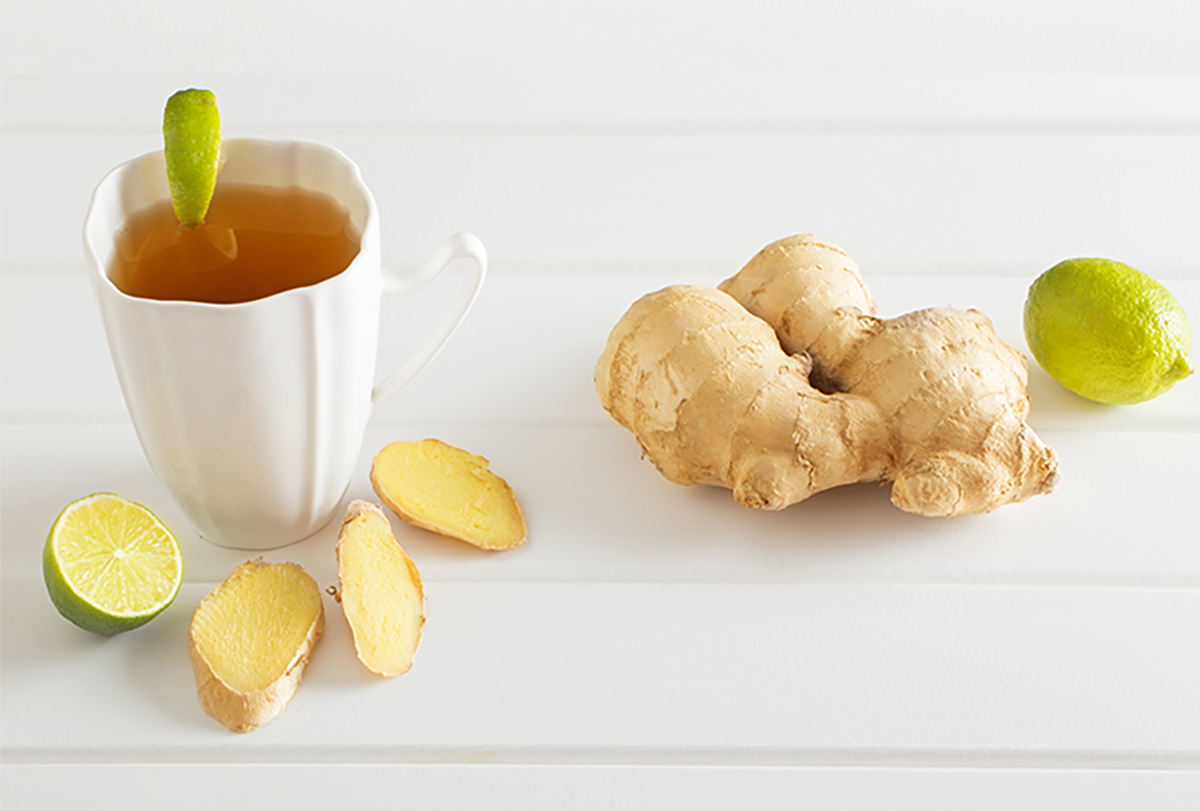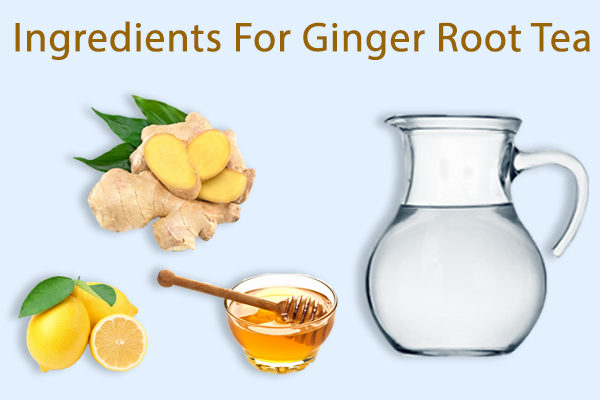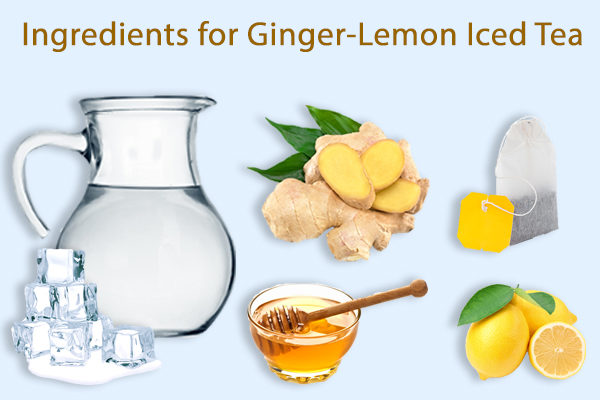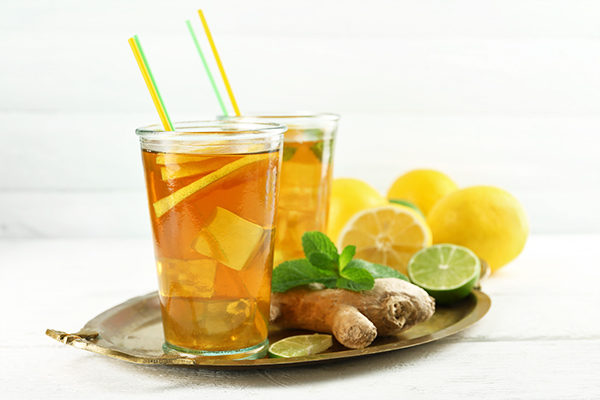How to Make Ginger Tea and It’s Health Benefits
Ginger has long been a part of traditional medicinal systems due to its many health benefits. Ginger roots are widely used for the preparation of ginger tea, an herbal medicinal drink, especially in India and East Asia, the Middle East, and Southeast Asia.

Ginger is a standard kitchen spice used worldwide and is obtained from Zingiber officinale (ginger plant). This perennial plant with grass-like leaves has firm, striated rhizomes.
Rhizomes are horizontal underground stems that give rise to roots. The kitchen ingredient commonly known as ginger roots is actually rhizomes.
Compounds of Ginger Tea
Ginger roots contain a multitude of essential oils and resins that are responsible for its medicinal properties, odor, and spiciness.
Advertisements
Many of the health benefits of ginger are derived from phenolic compounds, including gingerols, shogaols, and sesquiterpenes such as zingiberene, which are present in ginger oleoresin. (1)
Non-volatile ketones, including gingerol, are responsible for the pungent flavor and aroma of ginger. (1) Ginger also contains various vitamins, minerals, and compounds, including vitamins A, B, C, and E, phosphorus, calcium, zinc, iron, potassium, magnesium, and beta-carotene. (2)
Health Benefits of Ginger Tea
Ginger has been traditionally used for relieving morning sickness and its symptoms. Some studies show that it effectively alleviates pregnancy-induced nausea. (3)(4)(5) It may also help reduce the nausea and vomiting associated with antiretroviral drugs. (6)
Ginger supplements may be used as an alternative treatment for gastrointestinal problems such as colic, dyspepsia, and bacteria-induced diarrhea. (7)(8)
Ginger has been shown to have anti-inflammatory and antimicrobial properties and may offer cardiovascular protection. (1) Ginger has also been shown in some studies to provide benefits to individuals with arthritis. (9)(10)
Multiple clinical trials found that ginger powder or capsules may play a beneficial role in relieving menstrual pain. (11)(12)(13)(14) Ginger may also help subside migraine headaches, (15)(16) promote cardiovascular health, (17)(18) and aid relief from respiratory ailments. (19)
Advertisements
However, before taking ginger for any health ailment, consult your healthcare team first.
How to Make Homemade Ginger Tea
Enjoy a cup of ginger tea by following these easy homemade recipes.
1. Basic ginger root tea
Ingredients:

- 2 inches of fresh, raw ginger
- 1½–2 cups of water
- 2 tablespoons honey or agave (to taste)
- 1 tablespoon fresh lime juice (optional)
Directions:

- Peel the ginger and cut it into thin slices to maximize the surface area, which helps enhance the flavor.
- Boil the ginger slices in water for around 10 minutes. To make a stronger decoction, boil for 20 minutes.
- Turn off the heat and strain the tea.
- Add honey (or agave) and lime juice.
- Consume while still hot.
2. Ginger lemon iced tea
Ingredients:

- 1 inch of ginger root, peeled and sliced
- 5–7 bags of black tea
- 3 cups of water
- 2–3 tablespoons honey (sugar optional)
- 2 sliced lemons
- Ice
Directions:

- Pour 3 cups of water into a microwave-safe bowl and add several tea bags, depending on how strong you want the tea.
- Boil the water on the stove or microwave on medium for 2–3 minutes.
- To a 2-quart pitcher, add the sliced lemons and ginger.
- Add the water and tea bags and let it steep until it reaches room temperature.
- Remove the tea bags.
- Fill the pitcher with water and mix in the sugar.
- Refrigerate to cool.
- Pour the tea into glasses and add ice. Garnish using lemon slices.
Storage
Unpeeled ginger roots stay fresh in the refrigerator for about 3 weeks. They may be kept in the freezer for approximately 6 months.
Dried ginger powder should be stored in an air-tight glass container in a dark, dry, and cool place. Placing it in the refrigerator may extend its shelf-life up to a year.
Side Effects and Precautions
Although ginger offers numerous health benefits, consuming it in high amounts in foods or as tea may lead to some side effects, such as:
- Nausea and vomiting
- Diarrhea
- Acidity
- Low blood sugar
- Interrupted sleep
Refrain from giving ginger to children under 2 years of age. It is recommended to consult your doctor before using ginger tea or supplements daily.
Advertisements
The reason is ginger may not be suitable for people with blood disorders, heart problems, gallstones, and other health conditions. Additionally, ginger may interfere with the action of some medicines, including blood thinners.
Final Word
In folk medicine, ginger is regarded as a powerful healing agent on account of its anti-microbial, anti-inflammatory, cardioprotective, anti-emetic, and other medicinal properties.
Thus, adding this ingredient to your daily cooking can make your meals healthier and can aid digestion. You can also use ginger supplements to manage gastrointestinal distress, but only in doctor-prescribed dosages.
Ginger is considered a safe and healthy food, but excessive intake may cause unpleasant side effects in some people. One of the best ways to derive the health benefits of ginger without any adverse reaction is to consume it in the form of herbal tea.
Using other beneficial ingredients such as honey or agave and lime or lemon juice in the tea will add more antioxidants to the beverage and improve its taste.
But as with any other remedy, ginger tea is not a standalone treatment for any condition. It will only prove therapeutic when consumed in appropriate amounts and as part of an overall healthy, wholesome diet.
- Mao Q-Q, Xu X-Y, Cao S-Y, et al. Bioactive Compounds and Bioactivities of Ginger (Zingiber officinale Roscoe). Foods (Basel, Switzerland). https://www.ncbi.nlm.nih.gov/pmc/articles/PMC6616534/. Published May 30, 2019.
- FoodData Central Search Results. FoodData Central. https://fdc.nal.usda.gov/fdc-app.html#/food-details/169231/nutrients.
- Firouzbakht M, Nikpour M, Jamali B, Omidvar S. Comparison of ginger with vitamin B6 in relieving nausea and vomiting during pregnancy. Ayu. https://www.ncbi.nlm.nih.gov/pmc/articles/PMC4649576/. Published 2014.
- Viljoen E, Visser J, Koen N, Musekiwa A. A systematic review and meta-analysis of the effect and safety of ginger in the treatment of pregnancy-associated nausea and vomiting. Nutrition journal. https://www.ncbi.nlm.nih.gov/pmc/articles/PMC3995184/. Published March 19, 2014.
- Ding M, Leach M, Bradley H. The effectiveness and safety of ginger for pregnancy-induced nausea and vomiting: a systematic review. Women and birth: journal of the Australian College of Midwives. https://www.ncbi.nlm.nih.gov/pubmed/22951628. Published March 2013.
- Dabaghzadeh F, Khalili H, Dashti-Khavidaki S, Abbasian L, Moeinifard A. Ginger for prevention of antiretroviral-induced nausea and vomiting: a randomized clinical trial. Expert opinion on drug safety. https://www.ncbi.nlm.nih.gov/pubmed/24820858. Published July 2014.
- Giacosa A, Guido D, Grassi M, et al. The Effect of Ginger (Zingiber officinalis) and Artichoke (Cynara cardunculus) Extract Supplementation on Functional Dyspepsia: A Randomised, Double-Blind, and Placebo-Controlled Clinical Trial. Evidence-based complementary and alternative medicine: eCAM. https://www.ncbi.nlm.nih.gov/pmc/articles/PMC4411465/. Published 2015.
- Hu M-L, Rayner CK, Wu K-L, et al. Effect of ginger on gastric motility and symptoms of functional dyspepsia. World journal of gastroenterology. https://www.ncbi.nlm.nih.gov/pmc/articles/PMC3016669/. Published January 7, 2011.
- Therkleson T. Topical Ginger Treatment With a Compress or Patch for Osteoarthritis Symptoms. Journal of holistic nursing : official journal of the American Holistic Nurses’ Association. https://www.ncbi.nlm.nih.gov/pmc/articles/PMC4230973/. Published September 2014.
- Al-Nahain A, Jahan R, Rahmatullah M. Zingiber officinale: A Potential Plant against Rheumatoid Arthritis. Arthritis. https://www.ncbi.nlm.nih.gov/pmc/articles/PMC4058601/. Published 2014.
- Rahnama P, Montazeri A, Huseini HF, Kianbakht S, Naseri M. Effect of Zingiber officinale R. rhizomes (ginger) on pain relief in primary dysmenorrhea: a placebo randomized trial. BMC complementary and alternative medicine. https://www.ncbi.nlm.nih.gov/pmc/articles/PMC3518208/. Published July 10, 2012.
- Daily JW, Zhang X, Kim DS, Park S. Efficacy of Ginger for Alleviating the Symptoms of Primary Dysmenorrhea: A Systematic Review and Meta-analysis of Randomized Clinical Trials. Pain medicine (Malden, Mass.). https://www.ncbi.nlm.nih.gov/pubmed/26177393. Published December 2015.
- Kashefi F, Khajehei M, Alavinia M, Golmakani E, Asili J. Effect of ginger (Zingiber officinale) on heavy menstrual bleeding: a placebo-controlled, randomized clinical trial. Phytotherapy research : PTR. https://www.ncbi.nlm.nih.gov/pubmed/25298352. Published January 2015.
- Khayat S, Kheirkhah M, Behboodi Moghadam Z, Fanaei H, Kasaeian A, Javadimehr M. Effect of treatment with ginger on the severity of premenstrual syndrome symptoms. ISRN obstetrics and gynecology. https://www.ncbi.nlm.nih.gov/pmc/articles/PMC4040198/. Published May 4, 2014.
- Maghbooli M, Golipour F, Moghimi Esfandabadi A, Yousefi M. Comparison between the efficacy of ginger and sumatriptan in the ablative treatment of the common migraine. Phytotherapy research : PTR. https://www.ncbi.nlm.nih.gov/pubmed/23657930. Published March 2014.
- Martins LB, Rodrigues AMDS, Rodrigues DF, Dos Santos LC, Teixeira AL, Ferreira AVM. Double-blind placebo-controlled randomized clinical trial of ginger ( Zingiber officinale Rosc.) addition in migraine acute treatment. Cephalalgia : an international journal of headache. https://www.ncbi.nlm.nih.gov/pubmed/29768938. Published January 2019.
- Wang Y, Yu H, Zhang X, et al. Evaluation of daily ginger consumption for the prevention of chronic diseases in adults: A cross-sectional study. Nutrition (Burbank, Los Angeles County, Calif.). https://www.ncbi.nlm.nih.gov/pubmed/28336112. Published April 2017.
- Kulczyński B, Gramza-Michałowska A. The importance of selected spices in cardiovascular diseases. Postepy higieny i medycyny doswiadczalnej (Online). https://www.ncbi.nlm.nih.gov/pubmed/27892897. Published November 14, 2016.
- Chang JS, Wang KC, Yeh CF, Shieh DE, Chiang LC. Fresh ginger (Zingiber officinale) has anti-viral activity against human respiratory syncytial virus in human respiratory tract cell lines. Journal of ethnopharmacology. https://www.ncbi.nlm.nih.gov/pubmed/23123794. Published January 9, 2013.
- Was this article helpful?
- YES, THANKS!NOT REALLY






